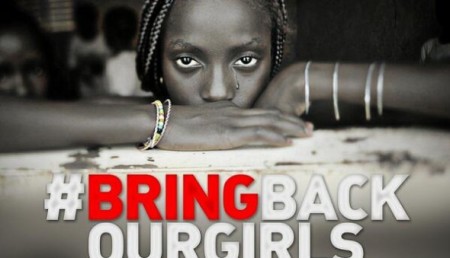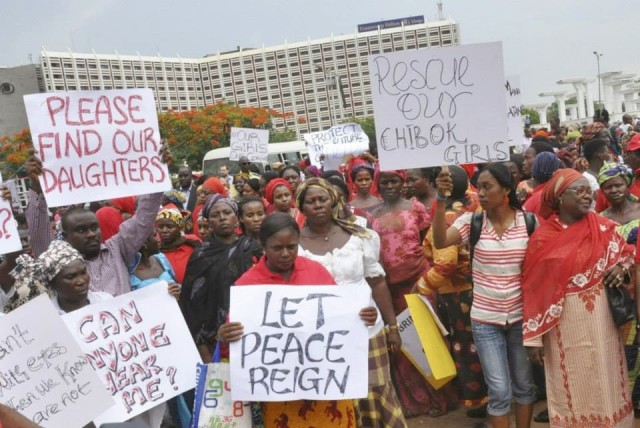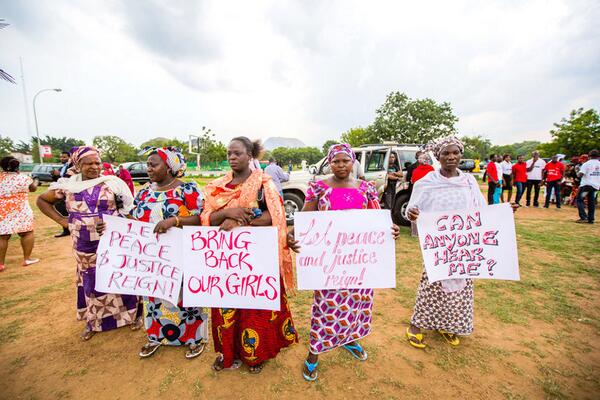The abduction of over 200 girls in Chibok, a small town in Northern Nigeria, has after nearly a month, finally sparked global outrage. Christians, Muslims, celebrities and public figures from all over the world, have come together under the hashtag “BRING BACK OUR GIRLS” to protest the inhumane actions of Boko Haram; a group of Nigerian Islamic fundamentalist with seemingly unshakable anti-western views (their name roughly translates to ‘Western education is a sin’). A group who have also dubbed themselves the Nigerian Taliban.
The conscience of the people of Nigeria was roused by a rally organised by Joe Okei Odumakin a human rights advocate, social critic and president of Women Arise for Change Initiative. This action was prompted by the lackadaisical and apathetic response of the Nigerian government to the plight of her citizen. The attitude of the state and federal authorities which reeks of irresponsibility and ignominy, has been described as inhumane and lacking in compassion for the sufferings of the school girls and their parents.
There are claims that the kidnapping of the girls could have been averted had the Nigerian authorities responded to an alert that Boko Haram was planning to raid the school where the girls were taking their examinations. It has also been claimed that the West African Examination Council had suggested a safer centre out of Chibok but that the Security Establishment did not take any action to prevent the mayhem. The kidnapping of the girls, who are said to have been tricked into following the militants, disguised in army uniforms, seems to be the climax of the groups reign of terror in Nigeria.
Schools, as well as churches, government institutions and even mosques have been blown up, young boys have been massacred and over 4000 people have tragically died as a result of the violence that has been taking place since 2009, after the execution of Boko Haram’s former leader Mohammed Yusif.
Perhaps the Nigerian authorities did not have the capacity to deal with the Boko Haram insurgency even in a region where it has declared a state of emergency. However the response of the international community to come to the aid of Nigeria and quell the menace of Boko Haram is something that was initially rejected by Goodluck Johnathan and his government
The families of the kidnapped girls did their best to rescue their daughters from the claws of the vermin when they took matters into their own hands and went into Sambisa forest. However when they thought they had found Boko Horam’s hide out and asked for military assistance the soldiers refused. The refusal of the soldiers could perhaps be attributed to threat of the leader of Boko Haram that the girls may be killed if the government intervened.
While the government’s lack of intervention in not only the kidnappings but other attacks by the militant group leaves much to be desired, one must question what can really be done to combat religious fundamentalism. Boko Haram’s violent behaviour stems from the belief that Islam is the right religion, and will stop at nowhere to impose this view on others.
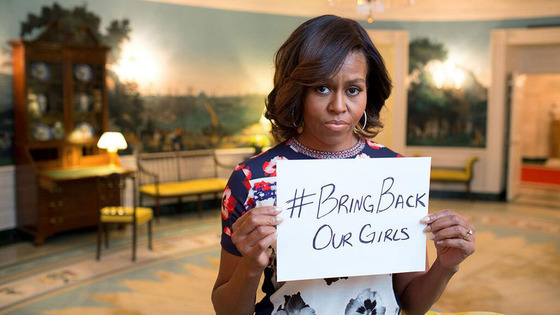
In 2012 the group issued a statement saying ‘that they [Nigerians] must follow the right religion, or there will be no peace for them’. Their aim, it would seem, is to establish an Islamic state in Nigeria, with no regards to religious tolerance and the consequences of imposing their religious beliefs on others in what is a secular state. The probable costs in human life and the potential physical and psychological damage to the people did not and does not matter to them.
Many Islamic scholars have argued against Boko Haram, and other militant groups’, use of Islam to justify their heinous actions. They insist that Islam is a peaceful religion, and those who perpetrate violence in the name of Islam are not true Muslims. As is usually the case with religious extremism, religion is being used as a justification for horrific and heinous crimes which are in no way justifiable in the first place.
One cannot talk about the abduction of these young girls without discussing the part that a disgruntling view of women and girls place in society had on the incident. The idea that girls and women belong in marital homes, beds and kitchens rather than in schools is one that is felt strongly by those who follow an extreme form of Islam.
According to Boko Haram, this is the reason why they kidnapped the girls, whose school had initially been shut as a result of the group’s movements in the area, but was reopened to allow the girls to take their exams.
In a video released by Boko Haram following the kidnapping Abubakar Shakan claimed: ‘God instructed me to sell them (the girls) they are his properties and I will carry out his instructions’. Other information released has claimed that Boko Haram was not only forcing the girls to convert to Islam (some of the girls stolen are Christians) but are also planning to sell the girls to members of their group for only 2000 Naira, the equivalent of about £7, suggesting how little they value women as a whole.
It has been reported that ‘Borno State Coalition for Women’s Rights’ groups were willing to mobilise thousands of women to embark on a voluntary search and rescue mission into the notorious Sambisa forest to ensure the release of the abducted Government Girls Secondary students. A leader of the group Professor Hauwa has strongly condemned the abduction of the school girls as a violation of their human rights, a crime against humanity which is prohibited under international law.
It is a great injustice that in this day and age and in a country that is aspiring to be a modern state, that such atrocities against young women can occur with very little being done by its government. The lack of urgency that Nigeria, a country trying to establish itself as a modern state with modern values is shocking at best. When the kidnappings first took place the government released a false statement claiming to have rescued the girls, which they were then forced to revoke. In addition, Patience Jonathan, Nigeria’s first lady allegedly demanded the arrest of protesters and according to protest leader Saratu Angus Ndirpaya accused them of lying about the kidnapings and claimed that Mrs. Jonathan had said that they ‘just wanted to give the government a bad name.’
While the campaigns, protests and celebrity backing are all good in the sense that they are raising awareness of what is going on, Nigerians must rise against any obstruction to the fundamental human rights of its people including equal opportunities in education and the work place.
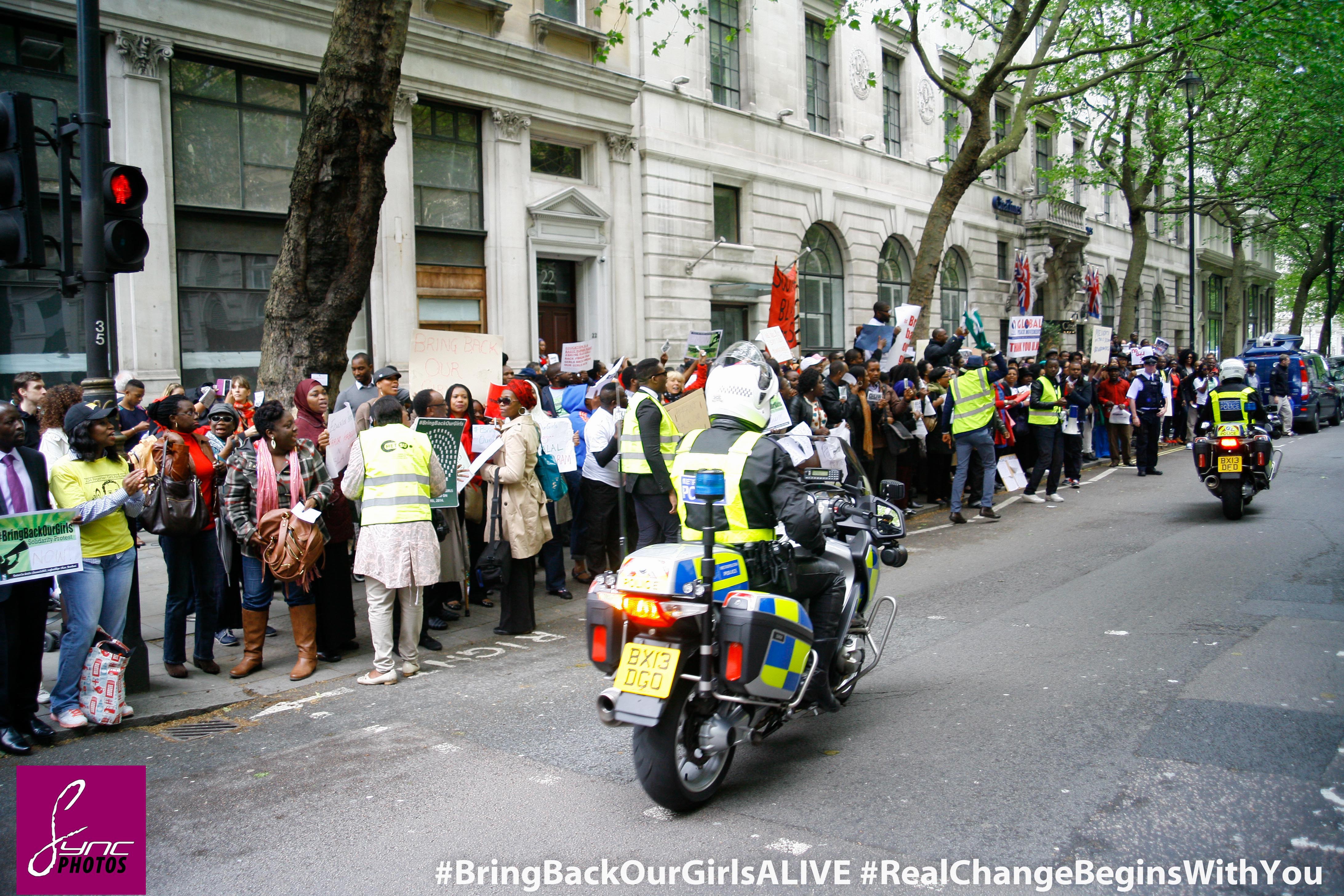
Image: Sync photos
#bringbackourgirls


